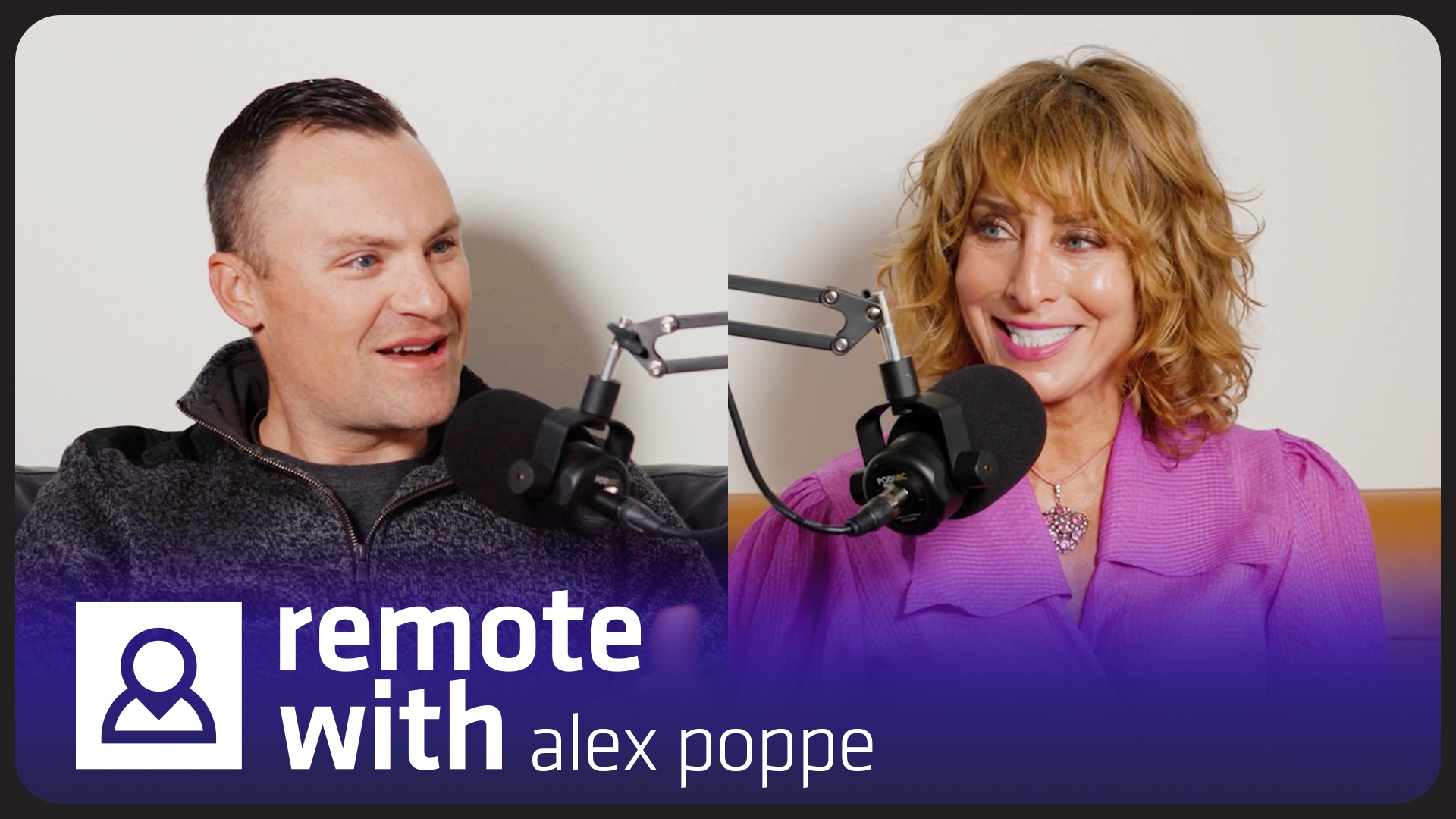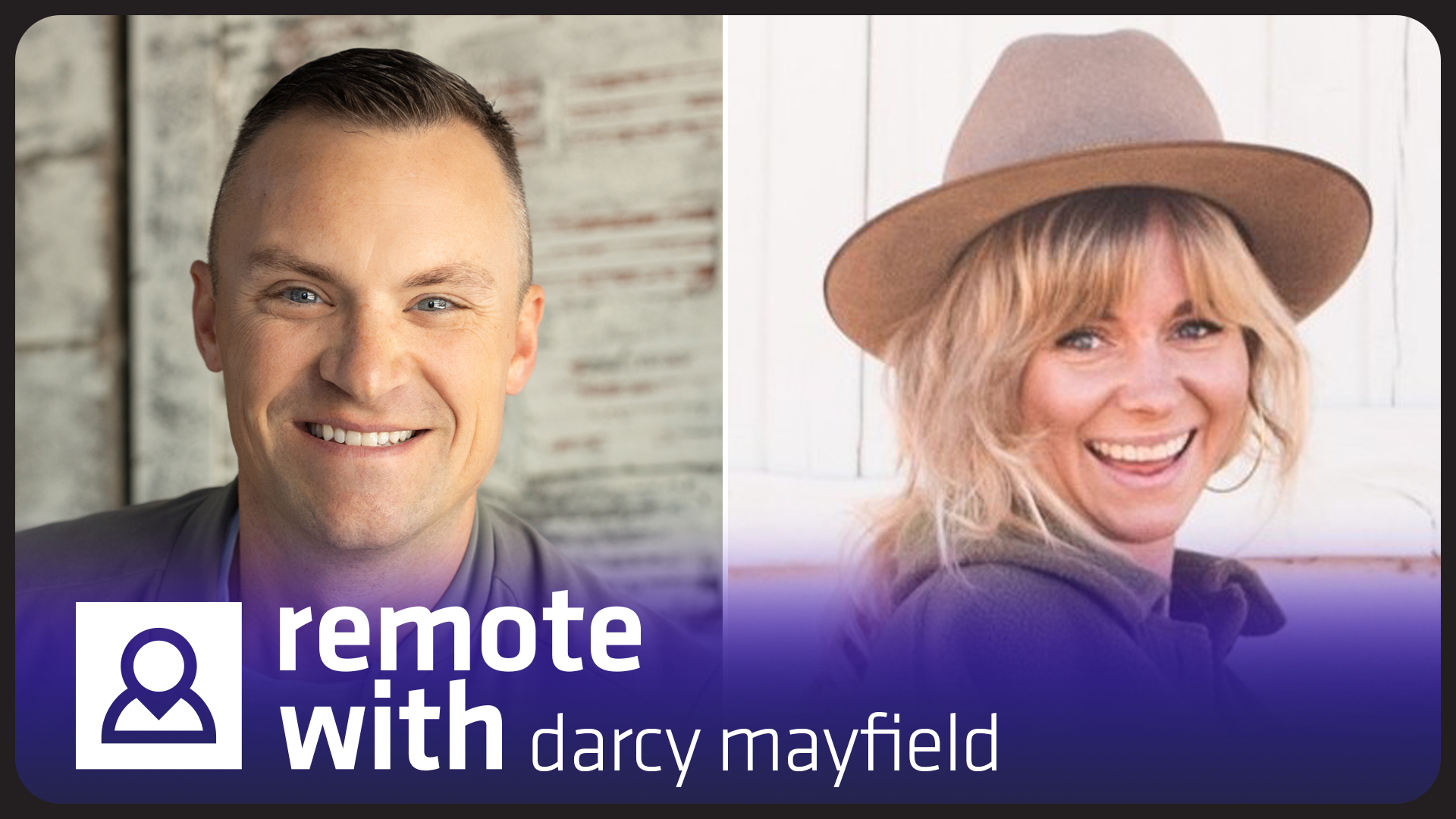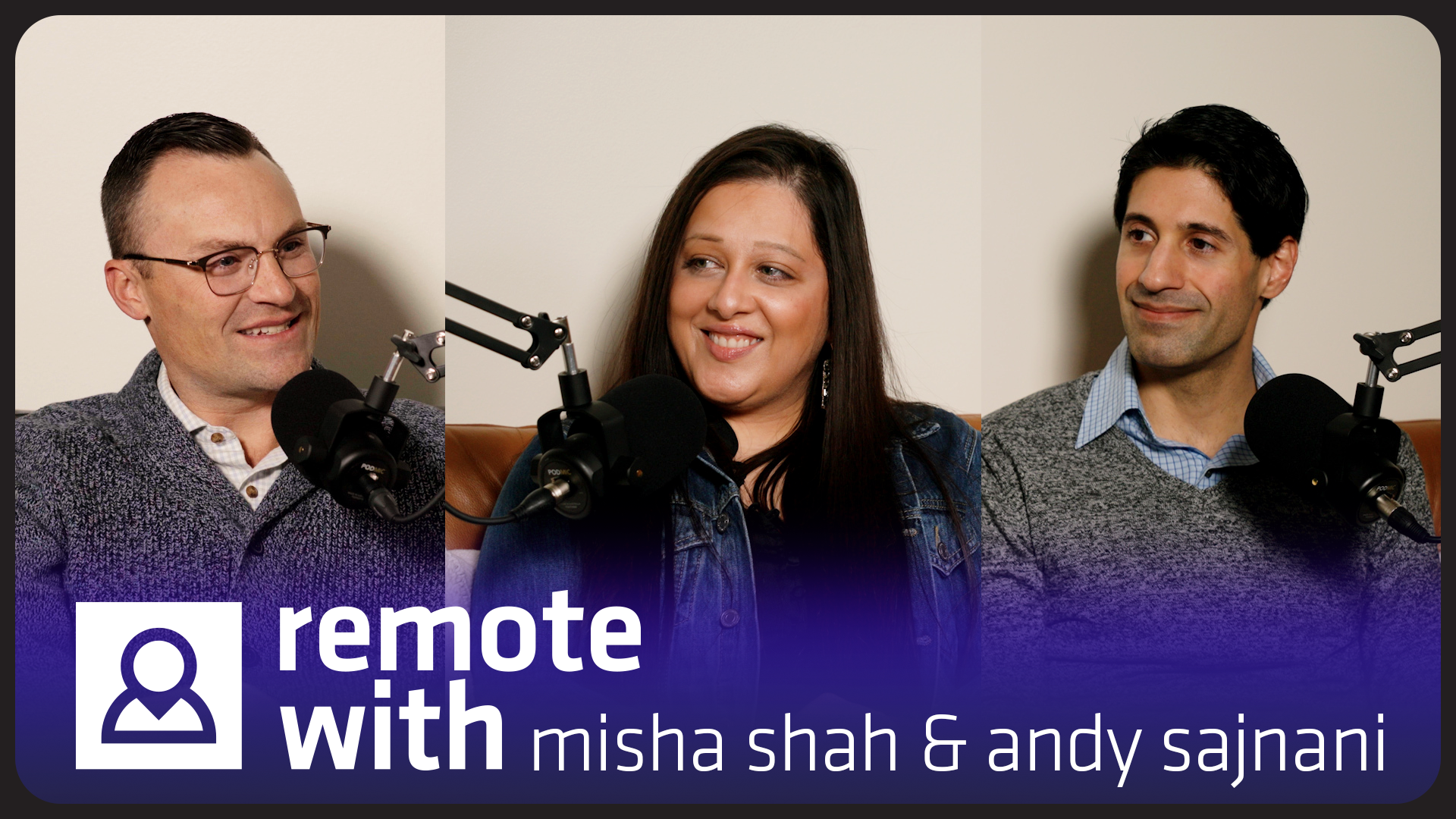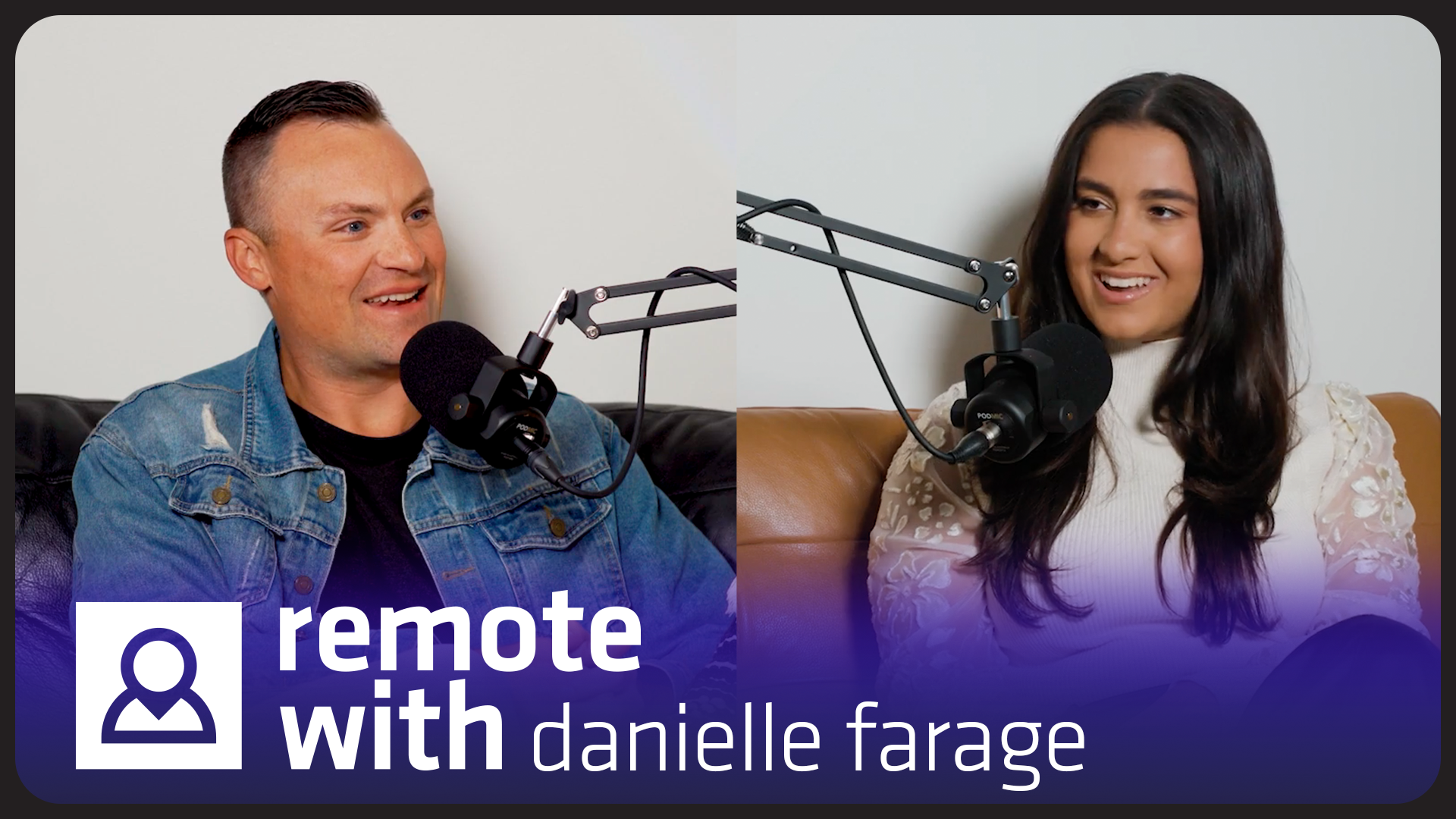Transcript
Alex Poppe: And I feel like that's so emblematic of Tulsa. Like there's a real kindness here.
Justin Harlan: Hi, I'm Justin Harlan, Managing Director for Tulsa Remote, and we are here with another episode of Remote With. Today, I have the pleasure of talking with Alex Poppe, who has been in Tulsa for a couple of years now. I'm looking forward to having this conversation and learning about your journey here, what has come out of your experience here in Tulsa, and what the future holds. Thanks so much for being here with us.
Alex Poppe: Oh, thank you for having me. Very happy to be here.
Justin Harlan: So let's just start with how did you find out about Tulsa? How did Tulsa even get onto your radar as something that you wanted to consider?
Alex Poppe: When I was living in Iraq and thinking about if I come back to the States, where do I want to live? I have metrics that I evaluate a city on and some of them are very shallow.
Justin Harlan: Okay. This is a great place to start.
Alex Poppe: I look at things like live music, how much live music is in a city, and I was so surprised to see how much there is. You know, people talk about Nashville and Austin and Chicago, but they don't necessarily talk about Tulsa. But the musicians here are so good, and maybe this is just my friends' bands in Chicago, but a lot of them they can play but maybe they can't really sing, or they can sing and they really can't play. But every group I've ever seen in Tulsa, everybody can do everything and do it so well. So that was a great surprise. And then I looked at public transportation, which is really not great here. So that was like the only thing that faltered. So I was curious enough… I was really excited about the Arts District and the art scene. And then when I came down for the Tulsa Remote trip, everybody was super friendly. And that was like, yes, that made up my mind.
Justin Harlan: Okay, so friendly people, great art scene, awesome music, public transportation. All right, everybody's got their good and bad. So we'll take that. So you were teaching over in Iraq, and then you made the decision to come back to the United States. So what were you up to then? And obviously, to relocate with Tulsa Remote, you have to have a remote job. So what were you doing at that time that allowed you to relocate back to the States?
Alex Poppe: I had resigned from my job and then the pandemic struck. And so I rescinded my letter of resignation and I was very grateful the university accepted that so I could stay employed. And it was really tricky to be in northern Iraq during COVID. So I finished that contract and I was able to get a remote job with a smaller NGO. And that allowed me to come back to the United States. And then I was able to apply for Tulsa Remote because I had a remote job. I had this series of interviews and I was like, "God, I hope I get it. God, I hope I get it." And I remember my aunt was over for dinner and I got the call that I was going to be, I got invited to come to Tulsa Remote. I was shrieking in the hallways. My mom, my aunt were like, and I was like, "Yeah, I'm going to Tulsa."
Justin Harlan: And then was it Tulsa Remote that put Tulsa on your radar to begin with? Or were you looking into Tulsa in advance or how did that all kind of go down?
Alex Poppe: Well, I knew about Tulsa from the Artist Fellowship. Then the Tulsa Remote made it very attractive because it's hard to make friends when you're older, and you haven't gotten married or had kids or, you know, haven't lived in the United States for a long time. So it's not like I have a lot of network of friends in the U.S. My friends are in a lot of different countries abroad. So knowing that you did so much programming and activities to really get us engaged and involved was the selling point and also a big hook. I checked out nonprofits that I wanted to work with because they have that program that will train you to be on a board. So I found the Surayya Anne Foundation before I even moved. Then I right away took the Leadership Tulsa program which was great and there's so much synergy. It's so easy, there are no gatekeepers. I can't imagine rolling up to Chicago after being gone for decades and saying, "Hey, I want to work on the mayoral campaign." There's just not that access. Where here in Tulsa, it's like if you have anything of skills to value, people are like, "Yeah, come play with us." And I love that about it.
Justin Harlan: Yeah. The low barrier of entry, no gatekeeping. It doesn't feel competitive. Like everybody's kind of trying to help each other win. I'd love to dig in more to your decision to get involved with Monroe and all of that. And we'll give some context there. But I'd love to just kind of go back a little bit first. So you mentioned you were living in Iraq. You were teaching there, right? Talk a little bit about the work you were doing there. And I'd love to hear, too, like, what was it about that experience that maybe prepared you for the move to Tulsa and kind of the way in which you've initiated those connections and involvement here?
Alex Poppe: So I lived in northern Iraq for two different periods. So one, I taught at an international high school in Erbil and did volunteer work in the city. And then I went to Germany for two years. And then I went and taught at a university on the other side of northern Iraq in a city called Sulaymaniyah. And it was great. There's a lot of work, and a lot of times it's boring. But every once in a while, something phenomenal happens. You find yourself in a position that I would have never thought I would have been in. So, you know, the students have these lived experiences that we don't always see depicted in mainstream media, in films and TV shows about war and violent conflict. And they'll tell you these stories that will literally break your heart. But they're not hardened. They're resilient and they're compassionate and they're very generous. And I'm always like, wow, how? But yet they are.
Alex Poppe: This belief that, you know, people are really the same everywhere. We kind of all want the same things for ourselves and our families… makes it easy for me anyway to leap into a new place. And I know that it's going to work out. You know, it might take a little bit of time, but I think people are good everywhere. It's institutions around them that succeed or fail. It's poor governance. It's a lack of plurality of voices at the decision-making table. But people themselves, you know, they're good. And there's a great book Anna Bodkin wrote a long time ago called "Peace Meals, Candy Wrap Kalashnikovs." And she went all through Afghanistan. She was a Boston Globe reporter at the time. And she was saying like, you know, you could sit down at a feast with a warlord or you could meet like a shepherd who's digging through sheep dung to find kernels to eat and either one will share that meal with you and as long as we have that part of our humanity intact, like we're going to survive like we'll be able to find a way through conflict.
Alex Poppe: Those sentiments have always stuck with me and they really kind of played out in Tulsa. I can remember walking to the dry cleaner near Mercury Lounge and I didn't have an umbrella and it was raining. And I asked the woman behind the counter, like, "Hey, is there a place to buy an umbrella here?" And she said, "Oh, you can check at that store." And they were closed and I came back. And this woman who had been behind me in line was getting in her car. And so she saw me walk back and she gets out of her car with an umbrella. And she's like, "Did you find an umbrella?" And I'm like, "No." And she's like, "Here, take this." I was like, "What?" She's like, "Take this. I have an extra and I have a car." And I feel like that's so emblematic of Tulsa. Like there's a real kindness here. You know, you can see it in the sense there's so many churches here, and yet there are over 150 nonprofits in a city that's got a half a million population.
Justin Harlan: Yeah.
Alex Poppe: So people recognize that there's a need, and they're willing to fill it. I think that speaks volumes about Tulsans.
Justin Harlan: I totally agree. That was one of the things in my previous job at Reading Partners that just always blew me away. At our peak, we had 2,000 volunteers that were showing up every week to read with kids in schools across the city. And just that level of generosity and kind spirit and, you know, active, being active in the problem solving across the city, as opposed to just expecting others to do it for you. But I love the perspective that you bring in. And I mean, I think just like the way that you show up in spaces as present and listening and loving on others, you're such a thoughtful person too. And I think it's so representative of, you know, the lived experience that you have and what you've seen across the world. And it's just so valuable, I think, to have that type of lens to create your worldview over time. And I think it shows up in all the interactions that you have too, which I really appreciate and respect about you.
So I would love to talk about Monroe and your involvement with his campaign. So for those listening, Tulsa just elected its first black mayor, which is so exciting. This is a big transition. And so I would be curious, for somebody who's new to town, like, why were you inspired to get involved with Monroe? And what was it that spoke to you about his campaign?
Alex Poppe: He's so real. He came to Leadership Tulsa to meet the cohort and answer questions. My question to him was, "I don't belong to a church. I don't have children. I'm not married. And I'm a newcomer here. No one's going to vote for me." And he laughed and he asked, you know, where I'd been. Iraq stuck out in his mind. So when I saw him again, I was like, "Hey, I want to volunteer for you. Do you remember me?" And he was like, "Yeah," and you were there. He brought me in for a hug. He's really personable.
Alex Poppe: But he, from the very beginning, knew why he was running and what the platform was about. He had a very holistic view. I'm going to be critical of certain leaders that don't think big picture. He always has. So, for example, he's like, "If we want to improve public school education outcomes, we have to address homelessness because 10 percent of first graders are homeless." And he built a platform that had a holistic approach to solving the city's most pressing issues. So safety, upskilling for job creation, public school outcomes, which goes into upskilling and job training. And then he's very data-driven. He's not afraid to be held accountable by that data. So he's just full of integrity, and I feel like that was the very first thing I saw when I met him that first time at Leadership Tulsa. I really felt at that moment he was a once-in-a-generation candidate because of his integrity. And then you see it's genuine because his entire professional life has been steeped in public service. And then you learn more about his family background. And you're like, "Yeah, of course. This is why he thinks how he thinks."
Justin Harlan: Yeah, that's awesome. I think what's, you know, first of all, so exciting about what the future holds here in Tulsa. I think it's a big moment for us as a city. Also just want to pull out the fact that you are so new, but got involved and took yourself off the couch and got directly involved in the future of the city. I think that's one thing that is special about this place. And to your point earlier about just lower barriers and less gatekeeping. There's a way to contribute here in Tulsa and make a difference. I think your voice is heard and there are very tangible ways to get involved, whether you're actually running for office or supporting somebody that is. And I think that's one of the things that's beautiful about this place as opposed to larger cities where maybe the bubbles are a little bit more exclusive. So it's awesome to hear that you've gotten involved in that way. Let's talk about the art scene that you mentioned earlier. So I know you were initially interested in Tulsa Artist Fellowship. And that's a program that you can look up online if you're listening, but it's a fellowship that also pays you to relocate and you're doing some work as an artist here in Tulsa. What were you doing as an artist? I know you've had different lanes as an artist. And I know that you recently also had a book, you know, what is that even called? A reveal? Or you released a book?
Alex Poppe: No, no. Pat at Magic City Books (please support independent bookstore, go to Magic City Books), he was very gracious to give me an event for prior work.
Justin Harlan: Okay, got it.
Alex Poppe: So I have a book coming out in May, except we're having issues on the cover design. So I'm wondering if it might get pushed to June. So that was the book event, which Monroe very generously came to, even though he and Dana were running through between events. They came, which I was like, I couldn't believe it.
Justin Harlan: So talk about your path as an artist, too. And what has surprised you most about Tulsa's art scene?
Alex Poppe: Wow, okay. So I'm a writer, but being here always makes me wish I were a visual artist. There's so much here. So I know you probably know Ann Puller James. I love her work. Listening to her journey, I think she's self-taught through during the pandemic, was like, "Wow, everything is really accessible here." My journey as a writer was a little different. I didn't start writing until 2010.
But in Tulsa, there's so much creative stimulation. So the music scene and the visual art scene are enough to creatively inspire the writing. And then Magic City again punches above its weight by the caliber of writers they have come in for events. Michael Cunningham, right? He was amazing. He didn't put a barrier between himself and the audience. He shook hands, hugged people, took photos. It's like, you're Michael Cunningham. So the writing scene, the whole art scene has been really surprising because it's a smaller city and you don't always expect to find it. But because it is smaller, you know where to go as opposed to, sometimes in Chicago, there'll be just so many competing events, all with big names. There's no possible way to be in all the places at the same time.
Justin Harlan: Given all the experiences that you've had, what do you think is most memorable or what will you carry with you most from your experience in Tulsa so far? Like, what's the thing that, because you have such a vast background and I think so many diverse lived experiences. I'm just curious, what do you think you'll take from this place, regardless of how long you live here?
Alex Poppe: I hope my friendships carry on. The book event at Magic City was very special because I was afraid no one was going to show up and it was pretty crowded. And it was musicians from the Tulsa music scene were there and artists were there and political people were there. And I looked out into the room and I was like, "Wow, this is everything I care about converging in one place." It felt really magical. Great friendships through Tulsa Remote. Grace, you know, I mean she's back in Denver but we're still very close. She's like family. I don't know what's been memorable. I feel like I work a little too much so part of it goes by in a whirl. And I feel like I haven't been as present and intentionally present as I like to be because I feel pulled in a bit too many directions lately. If I get very quiet, the overwhelming theme for me is kindness because I feel like just strangers on the street give it to you. You're walking on the street and people say, "Hi, how are you?" And it still takes me by surprise. Like that's after living in New York for over a decade, right? "Why are you talking to me?" So I feel like the kindness, you know? I just have seen and experienced exceptional kindness here.
Justin Harlan: That's awesome. And what would you say has changed most about your life?
Alex Poppe: I haven't like set up my own home, you know, because you get it when you're in some teaching contracts, you have housing provided for you. And I was always like, "Well, I'm here for a year. I'm here for two years." I mean, it was eight, but I never really decorated. So it's like the first time I've intentionally decorated. And it's, you know, you're not sitting on the couch. And I'm thinking to myself, I just bought my couch like two weeks ago and put it together right before Thanksgiving.
Justin Harlan: Well, then you had no choice.
Alex Poppe: I didn't have any furniture. I had the bed, the desk and the chair. That's it. So it's a place where I feel like I'm nesting and setting up a home, which is a new feeling. And I'm still kind of wrestling with that dog whistle of restlessness. Like part of me is itching to be in the field, but then I remember it was an intentional choice to come back to the United States and set up roots and community. And I intentionally chose Tulsa because I felt like there was so much support through Tulsa Remote to build those relationships that I would have a sense of community. It took a while to build a community, you know, because people had their lives and their families and their friends. And I'm very grateful that I have that sense of friendship from so many Tulsa Remoters and then people outside of Tulsa Remote as well. And it's like, I actually have a life here. I don't want to just walk away from that.
Justin Harlan: Yeah. You know, we think a lot about just what community means. I think over the last, at least when I've been going to conferences and things like that over the last year, maybe two, community, I think has become like a consistent buzzword. You hear it a lot. And so what I've been thinking a ton about and reading about is just, what do we mean by that? And obviously, at Tulsa Remote, we're trying to kind of create a prescription for finding community and integrating into the community that's here. And there's somebody that I read recently that was kind of tied to what you just said, which is that community is home. And when you really commit to a place and find, you know, like settle in and get the couch and see this as something that's bigger than yourself, that's when you feel at home and that's when you find community when it's not just this thing that you're going to do for a short term and then transition to something else, but it's something you're committed to.
Justin Harlan: And that to me is really powerful. And I love hearing that from you. It's like, I've got people here. I love the vibe. The arts are feeding my soul. And you're finding a lot of ways to commit to yourself personally and also leave this place better than when you arrived, which I really appreciate that. And just love the ways in which you've made not only your own community come to life, but also contributed to the communities that others are forming within Tulsa Remote and Tulsa. So with that, I want to thank you for making time for us today and just appreciate all that you do for the community at Tulsa Remote, but also the city. So thanks for being here, Alex.
Alex Poppe: Thank you, Justin. I don't take compliments well. It's a bit overwhelming. I'm very grateful for everything TR has done for me. And I can honestly say all of everything that's good in my life starts with TR. It really does, because you brought me down. That's how I learned about Leadership Tulsa. That's how I found out about Monroe. One of my closest friends introduced me to the contracting company that helped me get hired at USAID. So everything really is rooted to Tulsa Remote.
Justin Harlan: Yeah. Well, we don't take that lightly. We're grateful for the opportunity to make those connections and help you find this new life. And I'm glad you're thriving in it.





